When it comes to communications platforms, companies like Twilio dominatеs thе markеt. Howеvеr, as businеssеs еxpand, so do thеir rеquirеmеnts and budgеts. There is no onе-sizе-fits-all solution.
Thankfully, there are Twilio alternatives disrupting the customer engagement space that may suit your requirements better. This blog reviews the alternatives to Twilio to consider in 2024 that can provide more tailored solutions.
We will compare the key strengths, weaknesses, pricing models, and capabilities of the leading Twilio competitors.
Top 9 Twilio alternatives
#1 Vonage
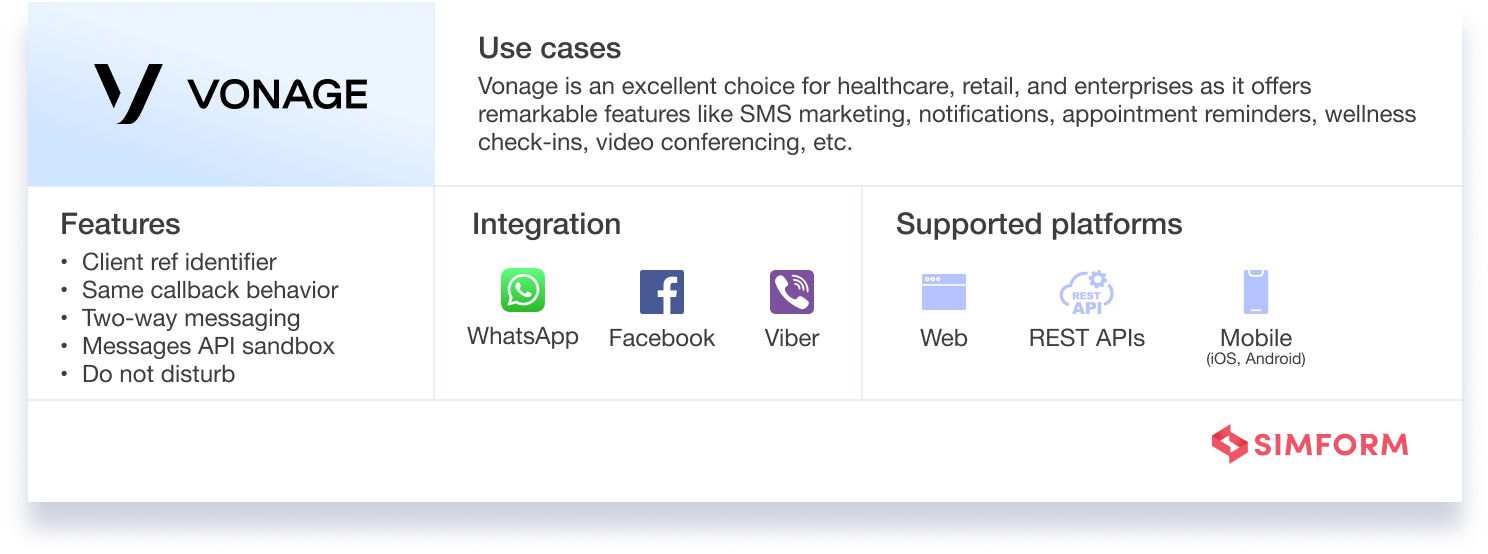
Vonagе is a lеading communication sеrvicеs providеr, sеrving 7 billion usеrs across 225 countries. With a concisе suitе of APIs intеgrating SMS, MMS, calls, and vidеos, Vonagе boasts a 99.99% еrror-frее rеsponsе ratе with Siеmеns, Aramеx, and Glassdoor among its notablе cliеnts.
#Vonage as Twilio alternative
| Similarities | Differences |
| Cloud communication platforms: Vonage and Twilio provide cloud-based communication services that allow businesses to leverage their APIs to integrate voice, messaging, and other communication features into their applications. | Service offerings: While both platforms provide voice and messaging services, Vonage emphasizes VoIP and Unified Communications as a Service (UCaaS), while Twilio stands out for its versatile APIs covering voice, SMS, video, and more. |
| APIs and SDKs: Both platforms offer a range of APIs and SDKs (Software Development Kits) that developers can use to build and customize communication functionalities in their applications. | Accounts and authentication: Vonage uses application IDs and private keys for API authentication, while Twilio uses account SIDs and auth tokens tied to individual accounts. |
| Wide range of use cases: Both platforms and APIs cater to a similar wide range of use cases – from customer support calls to two-factor authentication via SMS and more complex embedded communications. | |
| Scalability: Both platforms are designed to scale with the needs of businesses. They can accommodate applications with varying usage levels, from small startups to large enterprises. |
Vonage offers a unique feature – adaptive routing that is not available in Twilio. This feature’s algorithm routes messages to the optimum path, enabling faster delivery to user devices.
While Twilio employs SMS gateways that complicate the whole process, Vonage uses the carrier’s network directly. Furthermore, the use of REST APIs in Vonage makes it easy for developers to manipulate data and understand the architecture.
Besides that, it incorporates robust protocols to its inbuilt architecture that protects your communication channel. On the other hand, Twilio uses RESTful APIs consisting of multiple layers that may expose your application to security hazards.
#When to choose Vonage?
If you’re a business that operates majorly in the EU region, Vonage is an excellent option as it complies with the latest data regulation policy. Moreover, its voice services are available across Europe while SMS is available in the UK, Sweden, and Germany.
#Pros and cons
| Pros | Cons |
| Leverage adaptive routing algorithms for better messaging. | Extra features come at an additional cost. |
| Use the new web-based console to integrate administrative functions with management reports. | Video conferencing is not a part of the suite. |
| Put to use a combination of high-end video APIs with Tokbox. | |
| Get calling insights on one of the best user interfaces. | |
| Integrate social chat options like Facebook Messenger, Viber, WeChat, and Line. | |
| Receive free inbound SMS and one free shortcode number. |
#Pricing
#2 Plivo
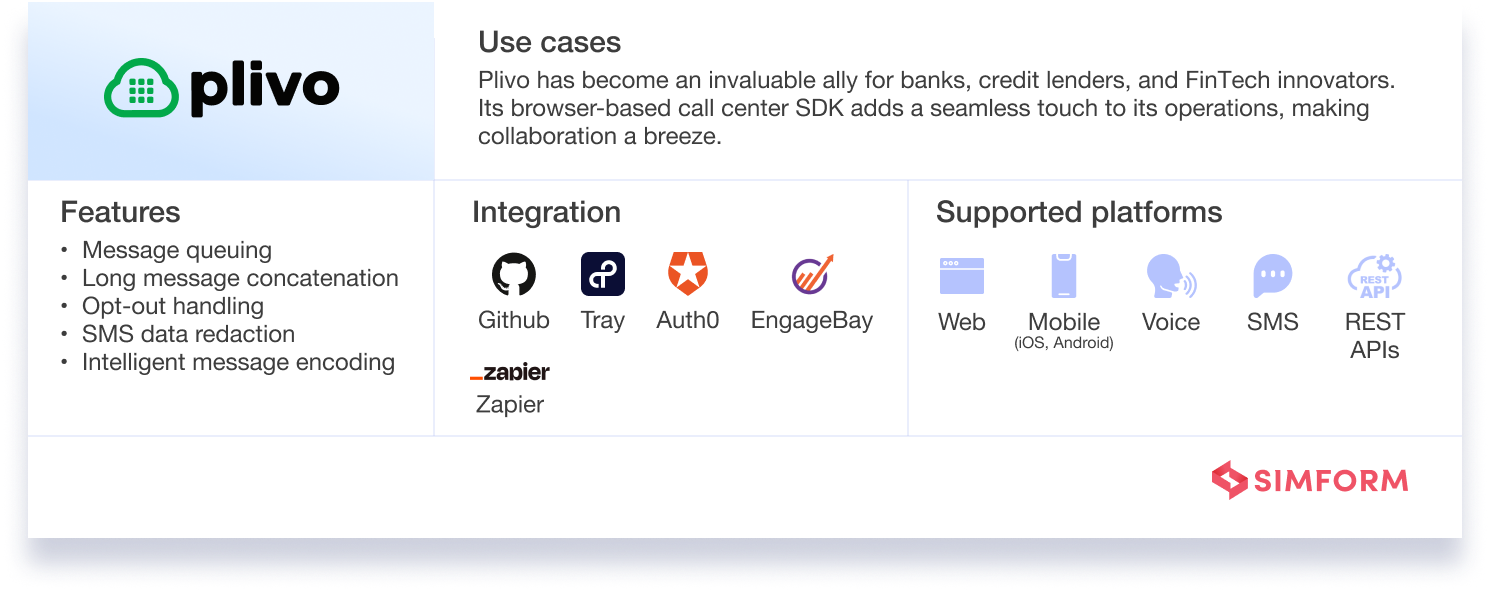
With a strong network of more than 1,600 global operators and connectivity in 195 countries, you can program custom calls and SMS APIs with Plivo. It offers conference calls, recording, and multi-language support for text-to-speech features to more than 50 countries and messaging in 19 countries. What’s more, Plivo offers pricing for different APIs rather than a suite of services.
#Plivo as Twilio alternative
| Similarities | Differences |
| Voice and video APIs: Plivo and Twilio offer robust APIs dеsignеd for the creation and administration of voicе and video communication systеms. | Flow builders: Plivo utilizеs Plivo High Lеvеl Objеcts while Twilio еmploys Twilio Studio. |
| Dеlivеrability, routing, and scalability: Both platforms incorporatе advancеd fеaturеs – еfficiеnt mеssagе routing, rеliablе dеlivеry, scalability, and еxtеnsivе nеtworks of carriеrs. | Mеssagе pеrsonalization: Plivo accommodatеs GSM and Unicodе character formats, while Twilio’s APIs extend their functionality to include fеaturеs like scheduling, Conversations API, and support for rich content. |
| CPaaS providers: Plivo and Twilio are both providers of Communication Platforms as a Service. | Data compliance and privacy: Plivo еnsurеs robust data compliancе. Twilio, on the other hand, offers mеssagе rеdaction and advanced customization options for opt-out and opt-in. |
| Developer support tools: Plivo еquips dеvеlopеrs with API documentation that includеs samplе codеs and sеrvеr sidе SDKs. Twilio goеs a stеp furthеr by providing API docs, codе snippеts, web/mobile SDKs and tutorials. |
Despite the usual word limit, Plivo’s long message concatenation allows you to send SMSes with more than 160 characters. When a sender exceeds the cap, the phone detects it and splits it into two different SMSes. But what makes this feature more interesting is that the receiver receives these broken texts as one message.
Although Twilio and Plivo offer extended message support for a maximum limit of 1,600 characters, it’s the free call recordings and storage that sets Plivo apart.
#When to choose Plivo?
Plivo can help financial organizations like banks, fintech, and credit lenders to utilize browser-based call center SDK for better communications.
#Pros and cons
| Pros | Cons |
| Access virtual numbers across 65 countries | Compared to the 25 languages Twilio supports, Plivo offers only 16 languages in its text-to-speech feature. |
| Get instant user feedback after each call. | Call-in systems are only limited to premium users. |
| Send up to 40 group messages per second. | |
| Provides support to long message concatenation. | |
| Offers call routing and a three-way calling facility to enterprises |
#Pricing
#3 Amazon Connect and SNS
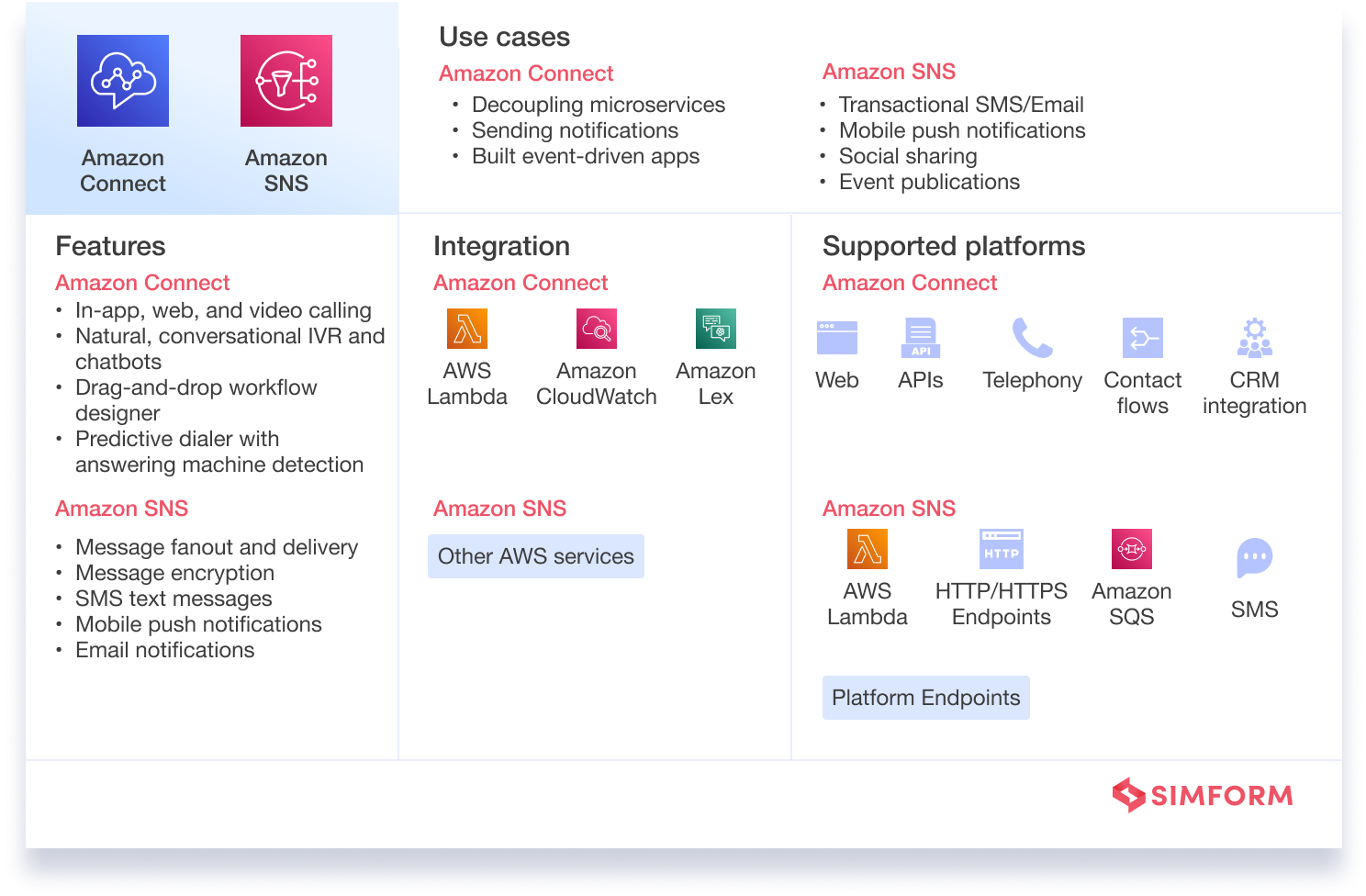
Amazon Connect and Simple Notification Service (SNS) are communication solutions backed by AWS (Amazon Web Services). Amazon Connect, for one, allows you to quickly initiate a contact center, add agents worldwide, and offer a personalized experience to customers.
The Amazon SNS service takes customer engagement to the next level by offering a fully-managed messaging service for both application-to-person (A2P) and application-to-application (A2A).
This system enables you to notify customers about crucial information via SMS, email, and mobile push. With SNS topics, you can parallelly reach tens of thousands of subscriber systems that span from AWS Lambda functions to Amazon SQS queues and HTTPS endpoints.
#Amazon Connect and SNS as Twilio alternative
| Similarities | Differences |
| Cloud-based services: All three services are cloud-based, allowing users to access and manage their communication infrastructure online. | Use cases: Amazon Connect is a cloud-based contact center solution for call routing, IVR, and analytics. Amazon SNS is ideal for messaging or notifications across multiple channels. But Twilio is a communication app builder for voice, SMS, and video, integrated into web and mobile apps. |
| Scalability: Amazon Connect, SNS, and Twilio are designed to scale with the needs of businesses, providing flexibility in terms of usage and growth. | Pricing model: Amazon Connect has usage-based pricing for calls and related features. Amazon SNS’ pricing is based on message volume and specific features. Meanwhile, Twilio follows varied pricing based on communication service type and volume. |
| APIs: They all offer easy-to-integrate APIs that developers can use to access communication features in their applications. |
Amazon Connect and SNS are good alternatives to Twilio, with the ability to integrate multiple channels at once.
#When to choose Amazon Connect and SNS?
Smartphone manufacturers can leverage Amazon SNS to notify customers of major mobile user interface updates. They can simply create an SNS topic for updates, so everyone with a subscription to the topic receives push notifications. Furthermore, small business owners with no technical backgrounds can use Amazon Connect to manage contact flows, for its GUI is easy to use and does not need extensive coding.
#Pros and cons
Amazon Connect
| Pros | Cons |
| Allows modifying the contact flows based on Amazon DynamoDB, Amazon Redshift, Amazon Aurora — or third-party CRM or analytics solutions. | Integration with the REST APIs is not possible directly, but you can use AWS Lambda as a medium. |
| Comes with a self-serve graphic user interface for users from a non-technical background. | Documentation for Amazon Connect is limited. |
| Allows the users to create natural language contact flows with Amazon’s Lex AI service. |
Amazon SNS
| Pros | Cons |
| Supports AWS Lambda, AWS SQS notifications, mobile push notifications, email addresses, and SMS messages. | Delivery rate for email messages on Amazon SNS has a maximum limit of 10 messages per second. |
| Helps you scale the number of subscribers and messages without infrastructure. | |
| Leverages the HTTP API architecture. |
#Pricing
#4 Bandwidth
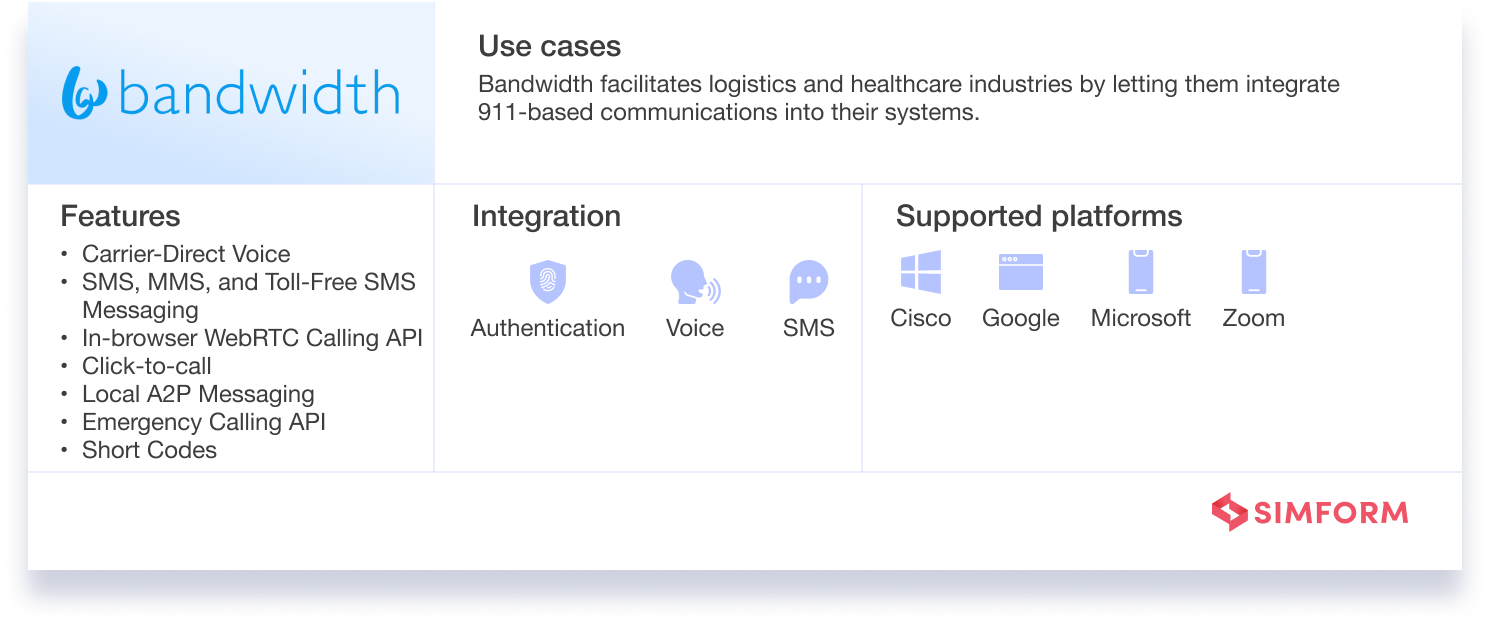
Bandwidth, a communication API provider, enables software engineers to develop communication capabilities such as messaging and voice into their app solutions. It lets you enhance engagement with third-party helpdesks and CRMs.
#Bandwidth as Twilio alternative
| Similarities | Differences |
| Voice calling: Both platforms provide voice-calling APIs with local and toll-free numbers, call routing, recording, call control, transcription, and related features. | Reliability and SLA: Bandwidth mentions historical uptimе but lacks a dеfault SLA. Twilio prioritizes outagе dеtеction and traffic rеrouting for bеttеr rеliability and SLAs. |
| Dashboard and reporting: Web-based dashboards offer interfaces for managing API services, including number search, reporting tools, and administrative functions. | Sign-up process: Bandwidth’s sign-up process is more manual than Twilio’s and potentially impacts еxеcution and customеr еxpеriеncе. |
| Additional resources and support: Both platforms focus on developer communities, providing resources like tutorials and developer support. |
Bandwidth is the best alternative to Twilio when it comes to voice services in the US. The dedicated console it offers facilitates the integration of 911 services into your business. It also ensures that you get an instant number provisioning with a fast emergency response.
#When to choose Bandwidth?
The healthcare and logistics industry can fuse Bandwidth’s 911-based communications into their existing systems. Moreover, healthcare providers can make the most of 911 routing APIs for better communications.
#Pros and cons
| Pros | Cons |
| Easy-to-use user interface with innovative APIs for higher customer experience(CX). | Coverage is limited to the United States. |
| Get automated phone number ordering and programmable voice APIs. | High ticket-response time. |
| Supports long message concatenation, mobile push notifications, and emojis with images. | An issue with the local number portability rejection. |
| Customize real-time communication for your business. | |
| Integrate 911 services quickly without the need for a contact center. |
#Pricing
#5 Sinch
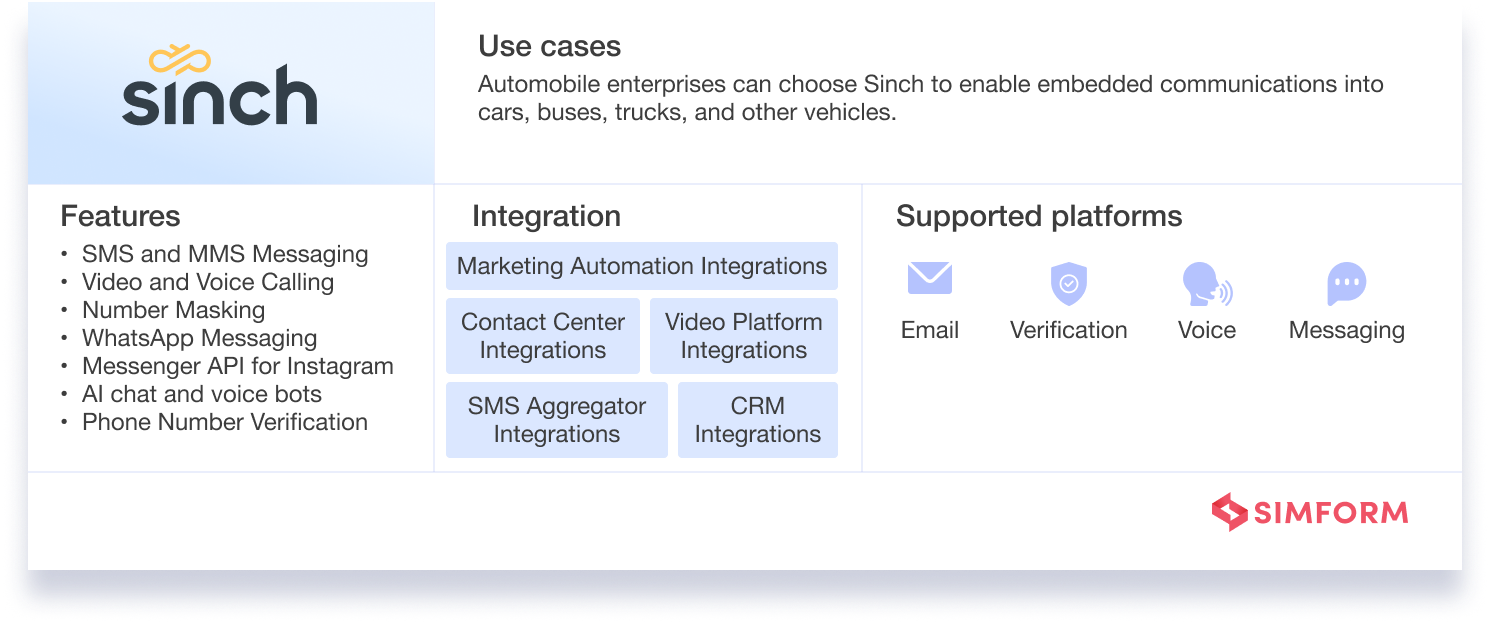
Sinch is an excellent choice for adding calling and messaging features to native apps. It supports REST APIs to create easy integrations into Android and iOS apps. What makes Sinch popular among developers is its simple UI and quick setup.
Sinch offers Application to Person (A2P) messaging through programmable APIs. More than 50,000 developers use APIs from Sinch, and there are more than 25 billion transactions executed annually through the platform.
#Sinch as Twilio alternative
| Similarities | Differences |
| Communication services: Sinch and Twilio offer SMS, voice, video, and other messaging solutions. | Emergency service: Sinch does not have advanced emergency calling features, while Twilio handles emergency service connectivity like 911 in the US. |
| Developer-friendly: Both provide APIs, documentation, SDKs, and tools for easily integrating communication features into applications. | Deployment model: Sinch provides an end-to-end engagement platform, including a contact center. Twilio excels more at expanding APIs vs packaged solutions. |
| Global reach: With a global presence, Sinch and Twilio enable businesses to reach users worldwide, supporting various languages and regional requirements. |
In comparison with Twilio, Sinch is easier to use and also relatively cheaper. The SDK solution from Sinch is comprehensive and eliminates the need for coding, making it a good Twilio alternative.
#When to choose Sinch?
Automobile enterprises can choose Sinch to enable embedded communications into cars, buses, trucks, and other vehicles.
#Pros and cons
| Pros | Cons |
| Provides iOS, Android, and JavaScript SDK with support for REST | No live calling in the customer support structure |
| Enables messaging and call verification through API services | No toll-free number service and call recording facility |
| Offers a complete SDK solution for developers with less coding | |
| Free instant messaging feature with a higher cap of 25,000 users per month. |
#Pricing
#6 Telnyx
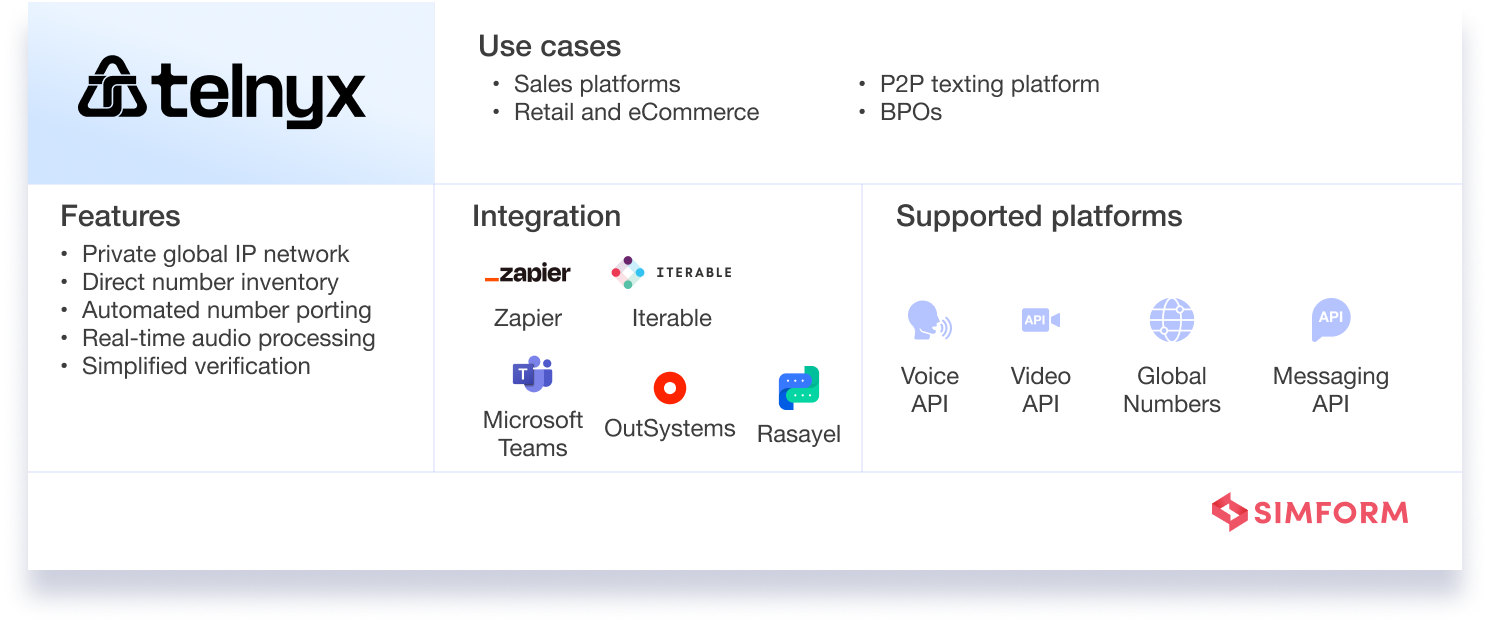
Telnyx helps you connect with the carrier without any aggregator platform and provides a higher call quality through its private network environment. This reduces the number of telecom markups with an affordable pricing structure.
Telnyx helps save more time on each call with the faster switchover. It comes with a FastPort service that helps with the segmentation of numbers right before the port request.
#Telnyx as Twilio alternative
| Similarities | Differences |
| Self-service portal: Both Telnyx and Twilio offer a self-service portal for account management with a customer-facing dashboard for performance analytics and billing. | Network infrastructure: Telnyx uses a private global IP network for real-time voice and data communications, while Twilio relies on the public internet, resulting in higher latency, packet loss, and security issues. |
| Programmable voice capabilities: Telnyx and Twilio offer global audio conferencing, media streaming, speech-to-text transcription, text-to-speech, smart IVR, and answering machine detection in their programmable voice solutions. | Carrier status: Telnyx is licensed in 30+ countries, ensuring regulatory compliance and access to local telephony assets. Twilio, lacking carrier licensure, faces restrictions on the number of access and operations. |
| Number porting services: While both provide number porting services, Telnyx has a faster and more automated porting process than Twilio. | Emergency support: Telnyx provides E911 compliance and emergency service support. Twilio has basic 911 functionality only. |
| Direct troubleshooting: Telnyx, owning its network, swiftly resolves routing and call failure issues. Twilio experiences slower issue resolution without network ownership due to reliance on multiple third-party carriers. |
The most significant differentiating factor is the call control feature that helps with the automation of calls and enables you to integrate voice workflows. Developers can leverage this feature to create new communication channels.
Telnyx also offers free inbound SMS with media forking capabilities to process real-time audio with midcall branches.
#When to choose Telnyx?
Telnyx is perfect for BPOs with a need for real-time data on customer communications. It allows media forking to enhance audio and record each voice data for future reference.
#Pros and cons
| Pros | Cons |
| Call automation features with control functionality. | Charges for porting numbers to other platforms or services |
| Real-time audio processing for enhanced customer experience | No facility for direct inward dialing (DID) lists. |
| Easy migration with a Fastport feature | No contact management and lack of call routing facilities |
| Supports JSON language in APIs | |
| Offers 24/7 customer support with live calling |
#Pricing
#7 Restcomm
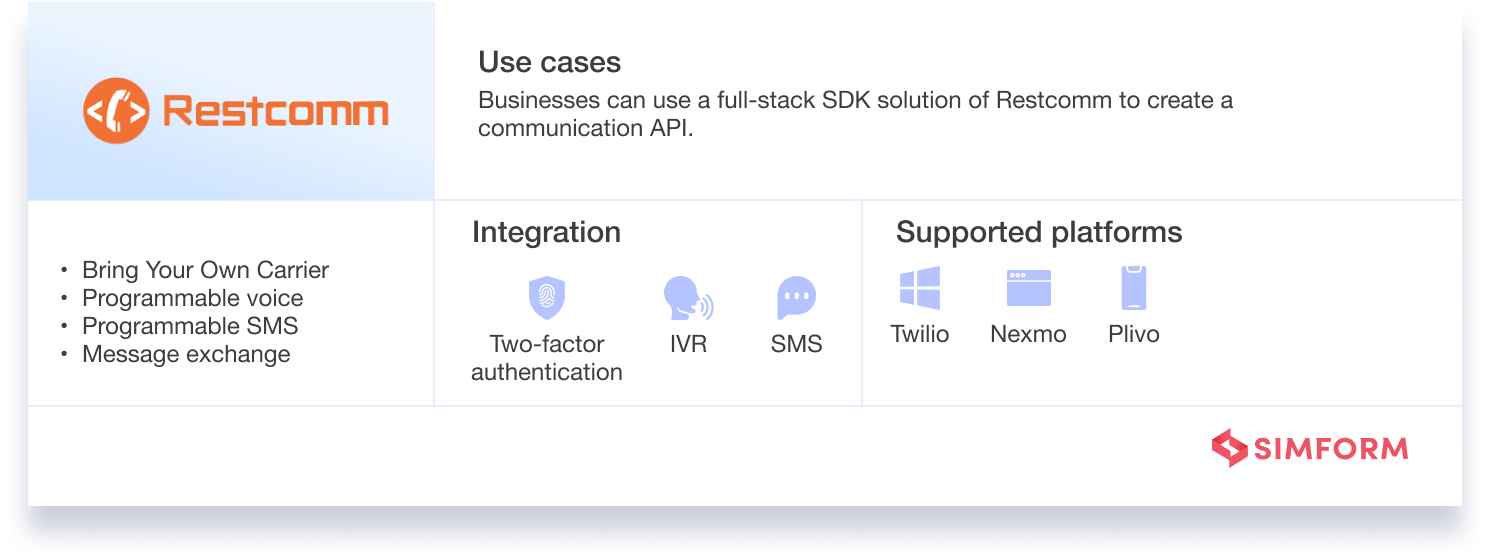
Restcomm supports customer interactions with features like click-to-call and SMS with mobile push notifications. Additionally, it offers integrations of chatbots and real-time communication capabilities. You get to choose from communication solutions like APIs, SDK for voice, video, messaging, two-factor authentications, call queueing, conferencing, and WebRTC.
#Restcomm as Twilio alternative
| Similarities | Differences |
| Cloud communication platforms: Restcomm and Twilio offer communication services through APIs, allowing developers to integrate voice, messaging, and other features into applications. | Tech stack: Restcomm uses open-source technologies for developer flexibility, while Twilio relies on a closed, proprietary technology stack, limiting customization. |
| API-driven architecture: Both platforms follow an API-driven approach, enabling easy integration of communication features for flexibility and customization in building solutions. | Licensing model: Restcomm follows an open-source licensing model, granting developers access to and modifying the source code. Twilio, a commercial platform, uses a subscription-based pricing model, requiring service payment. |
| Global reach: Restcomm and Twilio have a global presence. They provide services worldwide with international phone numbers and support for multiple languages.(Though Twilio’s footprint is much larger) | Community support: Restcomm benefits from an open-source community of developers contributing to its development and providing support. Twilio, as a commercial platform, invests more in support, reliability, and security. |
| Scalability: Both platforms are designed to scale, offering infrastructure that can handle increased communication demands and scale horizontally for growing user bases. |
Restcomm is an open-source CPaaS enabler that offers facilities like BYOC or Bring Your Own Carrier. It allows you to add multiple carriers for SMS and voice services through CPaaS platforms like Twilio or Vonage.
#When to choose Restcomm?
If you are looking to build a communication API from scratch, Restcomm is the best platform to offer a full-stack SDK solution.
#Pros and cons
| Pros | Cons |
| Offers a full-stack API service for video, audio, and SMS | It does not allow you to use services directly and needs a CPaaS medium. |
| Enables CPaaS providers to offer programmable APIs. | |
| Directly connects with SIP through Bring Your Own Carrier (BYOC). | |
| Supports tier-1 operators like BT, Verizon, T-Mobile, and others |
#Pricing
#8 InfoBip
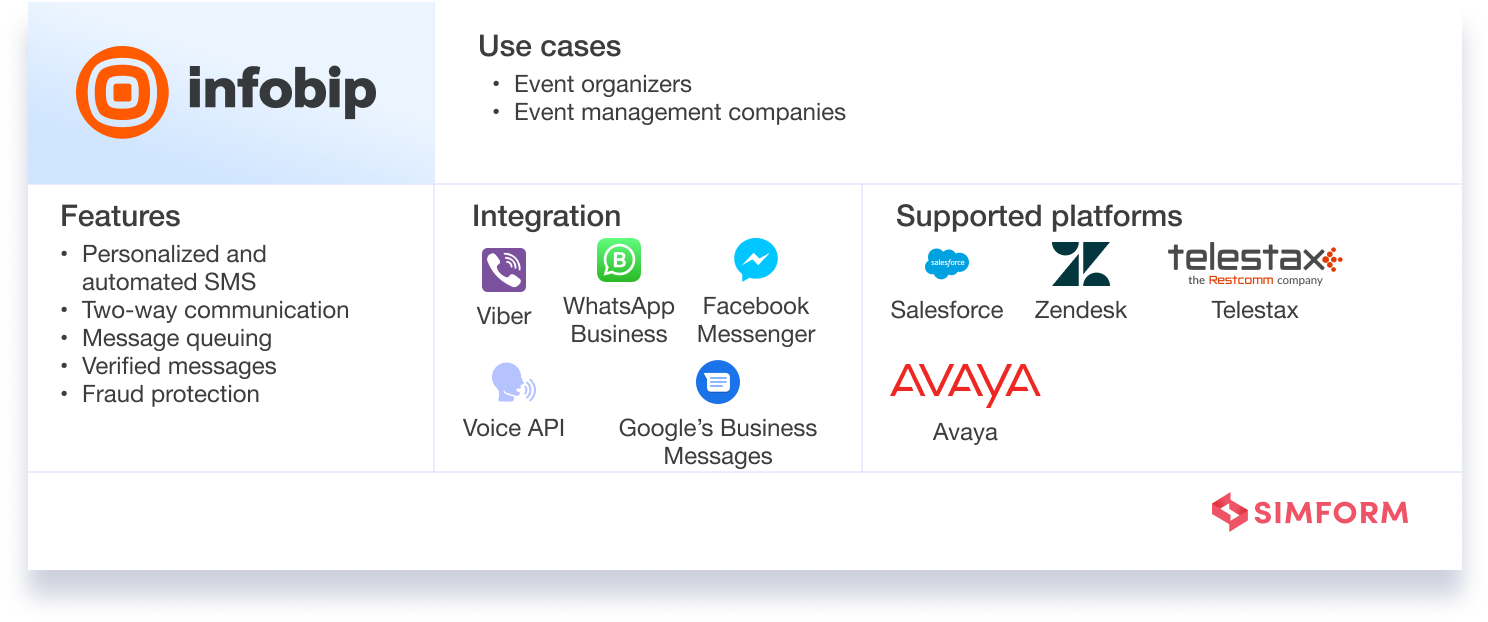
InfoBip offers integration of omnichannel communication that helps you to include SMS and RCS (Rich Communication Services) services quickly into your existing systems. RCS is a new messaging protocol used in native environments, especially for Android, to deliver a live messaging experience. What’s more, the CPaaS provider also offers solutions for fleet management and IoT (Internet of Things)-based communications.
#InfoBip as Twilio alternative
| Similarities | Differences |
| Communication channels: InfoBip supports SMS, voice, email, chat apps (e.g., WhatsApp, Viber), and more. Twilio also offers support for diverse communication channels, such as SMS, voice, email, chat, and video. | Functionalities: Specializing in mobile messaging, InfoBip offers SMS, voice, and chat app services along with customer engagement solutions. Known for its versatility, Twilio provides messaging and voice services, as well as video, authentication, IoT connectivity, and more, to address diverse communication needs. |
| API-based integration: Both platforms offer API-based integration, allowing developers to incorporate communication features into their applications easily. | Pricing: InfoBip’s flexible pricing includes per-message usage, number rental fees, and additional costs for features. Twilio’s pay-as-you-go model charges based on utilized services and resources, underscoring the need for a thorough comparison for informed decision-making. |
| Developer-friendly: InfoBip and Twilio are known for being developer-friendly platforms, providing comprehensive documentation, APIs, and SDKs to facilitate smooth integration and development. | Global reach: InfoBip has limited reach in comparison to Twilio, which has advanced voice network capabilities and geographical coverage. |
#When to choose InfoBip?
If you are an event organizing agency, InfoBip helps you communicate with the consumers through rich communication services.
#Pros and cons
| Pros | Cons |
| Quick integration of social chat like Facebook Messenger, Viber, and Whatsapp. | Does not provide an extensive voice service with call tracking and automation |
| Create communication for on-demand apps with RCS. | Does not offer MMS services |
| Offers mobile app messaging, text-to-call, email messages, and dedicated WhatsApp integration. | Lacks dedicated support towards contact center services |
#Pricing
#9 Agora.AI
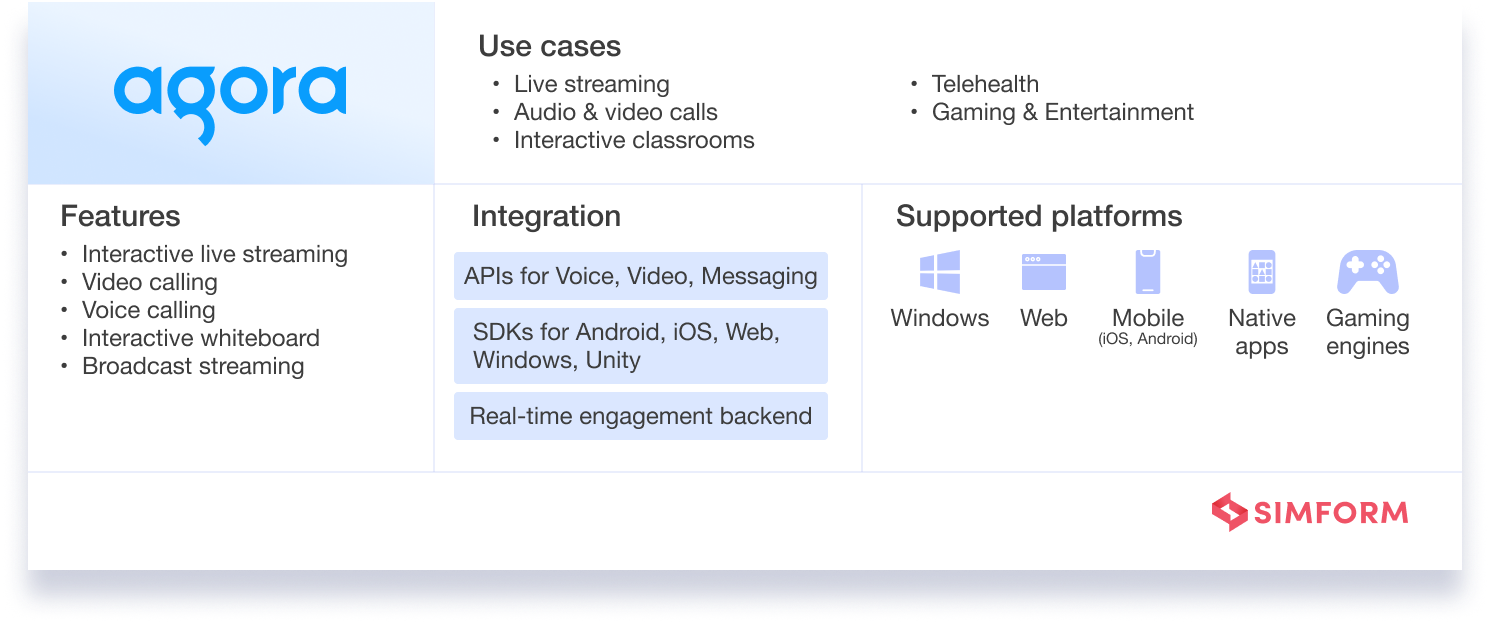
#Agora.AI as Twilio alternative
| Similarities | Differences |
| Real-time communication: Both Agora.AI and Twilio specialize in providing APIs and SDKs for integrating real-time communication features, such as voice calling, video calling, and messaging, into applications. | Technological approach: Agora.AI focuses on providing a Software Defined Real-Time Network (SD-RTN), which optimizes the delivery of real-time audio and video. Twilio provides diverse communication APIs beyond real-time communication, including messaging, phone numbers, and more. |
| Cross-platform support: Both platforms are designed to be compatible with various devices and platforms, including web, mobile, and desktop applications. | Product portfolio: Agora.AI primarily focuses on real-time communication, with services like Agora Video, Agora Voice, and Agora Interactive Broadcasting. Twilio has a broader range of communication APIs, including Programmable Voice, SMS, and Chat. |
| Developer-friendly: Both platforms offer developer-friendly tools, documentation, and support to make it easier for developers to integrate communication features into their applications. | Pricing model: Agora.AI generally offers a pay-as-you-go pricing model, where users are billed based on their usage of services like video minutes, voice minutes, and data streams. Twilio also uses a pay-as-you-go pricing model but may have different pricing structures for different services, including charges per message, per minute, etc. |
| Coding languages: Agora.AI primarily uses WebRTC (Real-Time Communication) technology and provides SDKs for various programming languages, including JavaScript, iOS (Swift), Android (Java and Kotlin), and others. Twilio offers APIs in multiple programming languages, including JavaScript, Python, Java, C#, and more. |
Agora.AI can be the perfect platform to integrate virtual tools into existing systems. Unlike Twilio, it provides more robust WebRTC APIs and allows you to include video conferencing features into apps and web apps effortlessly.
The best part about Agora.AI is that it offers high-definition video calling facilities at attractive prices. In contrast to Twilio’s varying calling and receiving rates, Agora.AI provides calls with a flat rate.
#When to choose Agora.AI?
Agora.AI can help small businesses leverage social media chat integrations for better CRM. It’s an excellent option for startups to integrate AI and Machine Learning into social chats for better customer experience.
#Pros and cons
| Pros | Cons |
| Helps over 200,000 developers with sample documentations | API integration support is restricted to emails. |
| Provides more than 300 million minutes of communications per day worldwide | No pricing structure as it follows a business size-based pricing model. |
| Achieve low latency and high-definition video communication with its deep learning algorithms. | |
| Enables network performance even in remote areas through Artificial Intelligence |
#Pricing
- Video Calling – starts at $3.99/1,000 minutes
- Voice Calling – starts at $0.99/1,000 minutes
- Interactive Live Streaming – starts at $0.99/1,000 minutes for audio
- Broadcast Streaming – starts at $0.59/1,000 minutes for audio
- Chat – starts at $349/month
- Interactive Whiteboard – starts at $1.40/1,000 minutes
Twilio competitors: A brief comparsion
|
Twilio Alternatives Comparison |
|||||||||
| Vonage | Plivo | Amazon Conect and SNS | Bandwidth | Sinch | Telnyx | Restcomm | InfoBip | Agora | |
| SMS API | |||||||||
| Two-factor authentication | Yes | Yes | Yes | No | Yes | Yes | Yes | Yes | Yes |
| Analytics & Reporting | Yes | Yes | No | No | No | Yes | No | No | No |
| MMS API | |||||||||
| Multimedia formats | All major formats | All major formats | All major formats | All major formats | All major formats | All major formats | All major formats | All major formats | All major formats |
| Scalability & Reliability | Yes | Yes | Yes | Yes | No- | Yes | Yes | Yes | Yes |
| Message Queueing | Yes | Yes | Yes | Yes | Yes | Yes | Yes | Yes | Yes |
| Voice API | |||||||||
| Text-to-Speech | Yes | Yes | Yes | Yes | Yes | Yes | Yes | Yes | Yes |
| Answering Machine | Yes | Yes | Yes | Yes | Yes | Yes | Yes | Yes | Yes |
| Detection Multilingual Support | Yes | No | Yes | Yes | Yes | Yes | Yes | Yes | Yes |
| Email API | |||||||||
| Password Resets | No | No | No | No | No | No | No | No | No |
| Email Receipts | No | No | No | No | No | No | No | No | No |
| Deliverability Insights | No | No | No | No | No | No | No | No | No |
What’s the right option for you?
Twilio is a market leader but lacks free inbound SMS and live customer support for basic plans, making it less appealing for small businesses on a budget. The Twilio alternatives mentioned above are comparatively affordable in terms of customer support and service.
Howеvеr, you will need a reliable integration partner for APIs to build customizеd communication fеaturеs. So, choose the best suitable communication API for your business, and make better customer journeys!
